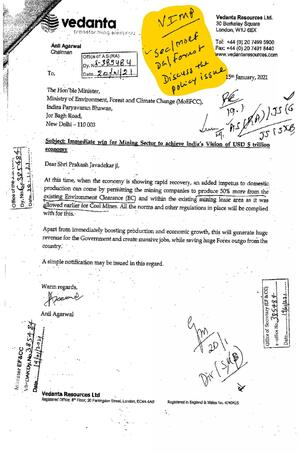3 सप्टेंबर 2023 रोजी वाढवण समुद्रकिनारीभव्य एल्गार मोर्चाचे आयोजन
3 सप्टेंबर 2023 रोजीवाढवण समुद्रकिनारीभव्य एल्गार मोर्चाचे आयोजन .. justice was trampled upon by allowing the expansion of the port to JNPT on certain conditions. A grand Elgar march has been organized on September 3, 2023 at the beach of Wadhwan to warn the government of the demand to cancel theWadhwan port forever, and to decide the direction of the further agitation, expressing outrage against this authority.
Inside Indian Energy and Mining Giant Vedanta's Campaign to Weaken Key Environmental Regulations
 Inside Indian Energy and Mining Giant Vedanta's Campaign to Weaken Key Environmental Regulations by Akshay Deshmane 31 August 2023
Inside Indian Energy and Mining Giant Vedanta's Campaign to Weaken Key Environmental Regulations by Akshay Deshmane 31 August 2023
https://www.occrp.org/en/investigations/inside-indian-energy-and-mining-giant-vedantas-campaign-to-weaken-key-environmental-regulations .
Report shows how mining and oil giant Vedanta successfully ran a covert lobbying campaign during the pandemic to weaken India's key environmental regulations. The Narendra Modi-led government approved the changes without public consultation and implemented them using what experts say are illegal methods.
In early 2022, after a series of closed door meetings, India’s environment ministry loosened regulations to allow mining companies to increase production by up to 50 percent without needing to hold public hearings, which many in the industry considered the most onerous requirement of the environmental clearance process.
Though the head of a major industry lobby group and India’s mining secretary also pressed for the rules to be loosened, internal documents and government sources suggest Vedanta’s lobbying was key. The environment ministry then changed the regulations by publishing an office memo — meant to be used for inter-office communication — on its website.
The year before Agarwal wrote to Modi, one of the company’s subsidiaries, Cairn Oil & Gas, also started lobbying to scrap public hearings for oil exploration projects. As with mining, the government quietly amended the law with no public consultation. Since then, at least six of Cairn’s oil projects in the northern deserts of Rajasthan have been greenlit for development...
Indian authorities blocked the websites of activist groups that were campaigning on environmental issues, including one that was fighting against a major new piece of environmental legislation.
In April, the Central Bureau of Investigation filed charges against environmental lawyer Ritwick Dutta, claiming he uses foreign funds to “take down” coal projects. Legal watchdog Article 14 cited experts describing the case as “replete with factual errors and misrepresentations” and saying it would “have a chilling effect on environmental litigation in India.”
This year, the Centre for Policy Research, a think tank, had its license to receive foreign funding suspended and tax authorities started looking into their records for alleged violations, reportedly due to its “involvement” with environmental causes.
- Hrut Collage - Urmila Samson Homeschool
- All Those Demanding a New Constitution Are Fighting for a Less Equal India
- Gaddar, Who Symbolised Revolutionary Politics, Leaves Behind Questions on Social Transformation
- A Salute to Achyut Yagnik
- Analysing the Adani-Ambani BUSINESS EMPIRE (and its impact on you)
Page 15 of 51
